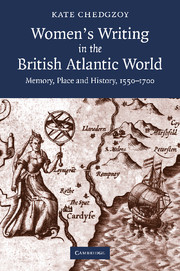Book contents
- Frontmatter
- Contents
- Acknowledgements
- Introduction: ‘A place on the map is also a place in history’
- Chapter 1 ‘The rich Store-house of her memory’: The metaphors and practices of memory work
- Chapter 2 ‘Writing things down has made you forget’: Memory, orality and cultural production
- Chapter 3 Recollecting women from early modern Ireland, Scotland and Wales
- Chapter 4 ‘Shedding teares for England's loss’: Women's writing and the memory of war
- Chapter 5 Atlantic removes, memory's travels
- Conclusion
- Notes
- Bibliography
- Index
Conclusion
Published online by Cambridge University Press: 22 September 2009
- Frontmatter
- Contents
- Acknowledgements
- Introduction: ‘A place on the map is also a place in history’
- Chapter 1 ‘The rich Store-house of her memory’: The metaphors and practices of memory work
- Chapter 2 ‘Writing things down has made you forget’: Memory, orality and cultural production
- Chapter 3 Recollecting women from early modern Ireland, Scotland and Wales
- Chapter 4 ‘Shedding teares for England's loss’: Women's writing and the memory of war
- Chapter 5 Atlantic removes, memory's travels
- Conclusion
- Notes
- Bibliography
- Index
Summary
Mapping the inscription in women's texts of the movements, displacements, losses and forgettings that make the sites of memory so important, this book has been concerned to recover the importance to history of memory's metaphorical, textual and actual places. I have tried here to offer a different kind of history of early modern British women's writing as it began to take up its place in a new Atlantic world, by telling a story about women's textual production which is geographically and linguistically expansive and inclusive. Re-membering women's autobiographical and cultural memories as part of the historical record of the early modern Atlantic world has the potential to transform our understanding of the major events and processes that shaped that time and place, and in doing so, mapped the contours of the world that we have inherited from it.
This book is in many ways itself a project of retrieval and rememory, asserting the value of recollecting authors who in many cases have been largely forgotten by dominant literary histories. To say so may seem to be tantamount to a confession that the attempts of the writers considered here to intervene in the recorded historical memory of the early modern period enjoyed limited success. The belatedness of this act of recollection in itself bears witness to the gendered and power-laden dynamics of remembering and forgetting of which writers as diverse as Lucy Hutchinson and Aphra Behn revealed themselves, in their works, to be painfully aware.
- Type
- Chapter
- Information
- Women's Writing in the British Atlantic WorldMemory, Place and History, 1550–1700, pp. 198 - 199Publisher: Cambridge University PressPrint publication year: 2007

